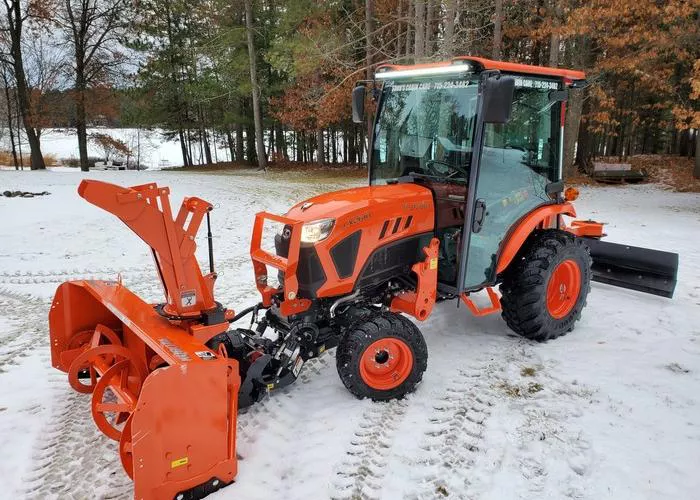As winter approaches, many homeowners face the challenge of clearing snow from driveways and sidewalks. While traditional gas-powered snow blowers have been the go-to choice for decades, battery-powered models have gained popularity in recent years. These electric snow blowers promise ease of use, reduced maintenance, and eco-friendliness. But are they really worth the investment? In this article, we will examine the working principles, benefits, limitations, and key considerations of battery-powered snow blowers to help you make an informed decision.
Working Principles of Battery-Powered Snow Blowers
Battery-powered snow blowers operate using electric motors powered by rechargeable lithium-ion batteries. These machines function similarly to their gas-powered counterparts but eliminate the need for fuel combustion.
Power Source – The heart of a battery-powered snow blower is its rechargeable battery, which provides the necessary energy to drive the auger and impeller.
Auger Mechanism – The auger scoops up snow and directs it toward the impeller or chute.
Impeller and Chute – The impeller throws the snow away from the cleared path through an adjustable chute.
Electric Start System – Unlike gas models that require a pull-start, battery-powered snow blowers start with a simple push of a button.
Drive Mechanism – Some advanced models include self-propulsion for easier maneuverability, reducing operator effort.
Advantages of Battery-Powered Snow Blowers
1. Eco-Friendly Operation
Battery-powered snow blowers produce zero emissions since they do not burn fuel. This makes them an environmentally friendly alternative to gas-powered models, which release carbon emissions and contribute to air pollution.
2. Quieter Performance
One of the biggest advantages of electric snow blowers is their significantly quieter operation. Gas-powered snow blowers can be extremely noisy, often exceeding 85 decibels, which can be disruptive in residential neighborhoods. Battery-powered models generally operate at lower noise levels, making them a more considerate choice.
3. Ease of Use
Push-Button Start – Unlike gas models that require priming and a pull-start mechanism, battery-powered snow blowers start instantly with a button.
Lightweight Design – These models tend to be lighter, making them easier to handle and store.
Low Maintenance – No need for oil changes, spark plug replacements, or fuel refills. Simply charge the battery, and it’s ready to go.
4. Cost Savings Over Time
While battery-powered snow blowers may have a higher upfront cost, they eliminate ongoing fuel and maintenance expenses. Gasoline prices fluctuate, and regular maintenance can add up over the years. A battery-powered model can offer savings in the long run.
5. Cordless Convenience
Unlike corded electric models that require an extension cable, battery-powered snow blowers offer complete freedom of movement. This makes them a practical option for clearing large areas without worrying about power outlets or tangled cords.
Limitations of Battery-Powered Snow Blowers
1. Limited Runtime
The most significant limitation is battery life. Most models run between 30 to 60 minutes per charge, which may not be sufficient for larger driveways or extended clearing tasks. Some users opt for an extra battery to extend operating time.
2. Reduced Power in Heavy Snow
Battery-powered models are typically best suited for light to moderate snowfall (up to 12 inches). In heavy, wet snow conditions, they may struggle compared to high-powered gas models, which have larger engines and greater throwing capacity.
3. Higher Initial Cost
While long-term savings are possible, the initial purchase price of a quality battery-powered snow blower can be higher than some gas models. Additionally, replacement batteries can be costly if needed over time.
4. Cold Weather Battery Performance
Lithium-ion batteries can lose efficiency in extremely cold temperatures. Users may experience reduced run time or slower charging speeds in freezing conditions, which can be a concern in harsh winter climates.
Key Considerations Before Buying
1. Average Snowfall in Your Area
- If you live in an area with frequent, heavy snowfalls, a gas-powered snow blower may be a better choice.
- For moderate to light snowfall regions, a battery-powered model can be highly effective.
2. Driveway and Clearing Area Size
- Small to medium driveways are ideal for battery-powered snow blowers.
- Large properties may require multiple battery packs or a gas-powered alternative.
3. Battery Capacity and Extra Batteries
- Consider a model with a high-capacity battery or purchase additional batteries to ensure you can complete the job in one go.
4. Snow Type
- Dry, fluffy snow is easier to clear with a battery-powered model.
- Wet, heavy snow may require a gas-powered snow blower with more torque and throwing power.
5. Budget and Long-Term Investment
- Factor in both upfront costs and long-term savings on fuel and maintenance.
- Evaluate battery replacement costs over time.
Conclusion
The decision to invest in a battery-powered snow blower ultimately depends on your specific needs and climate conditions. If you prioritize ease of use, low maintenance, and eco-friendliness, a battery-powered model is a great choice. However, if you regularly deal with heavy, wet snow or need extended runtime, a gas-powered snow blower might be a better fit.
For homeowners in regions with moderate snowfall and those looking for a quiet, hassle-free alternative to gas models, a battery-powered snow blower is absolutely worth considering. By weighing the pros and cons based on your situation, you can make an informed decision and enjoy a stress-free winter season.

